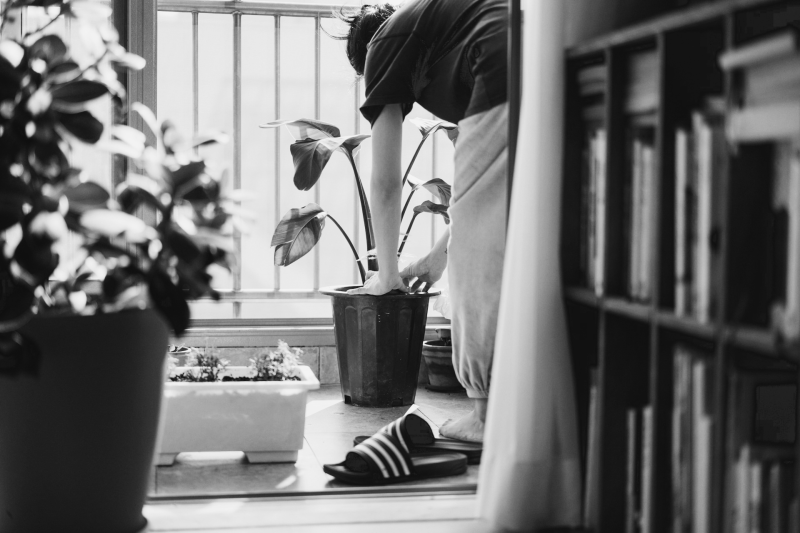People seek respite during their loneliest moments. In the past, life was slower, and every moment required a sense of intentionality. The respite was part of the routine as little moments of quiet unwinding. Today, not a single moment is wasted.
The increasing pace of the world has brought about numerous benefits to people. Life is easier, and wants and needs are met more easily than before. Yet, in this easy-to-live world, the noise and strain on the mind have been huge. The dullness of monotony occupies most moments, and the search for a second of peace and presence has been unfulfilling.
When life feels this dull, perhaps going back to the evergreen nature can help. Gardening used to be a collective activity, a part of daily chores everyone used to participate in. Now, it can be challenging to bring gardening home, but it is essential to understand that there is great importance in doing so. A little bit of gardening can go a long way to revive your connection to vitality.
Read below to understand the benefits of gardening for mental health and how you can start.
The psychological benefits of gardening
Nature and human psychology have been closely linked for nearly all of human history. The way nature affects the mind is profound, with unmatched strength. The absence of it can crush the mind to a gray palette, while its presence adds vibrant color.
Explaining how gardening affects the mind can be a broad and complex discussion. Here are some basic effects you can observe and understand immediately.
How plants reduce stress and anxiety
Gardening can help relieve stress and anxiety via physical activity and connection with nature.
The benefits of caring for plants (and mental health) include slow, deep breathing, which activates the body’s relaxation response and lowers cortisol (stress hormone) levels.
Engaging with plants and the outside environment provides a mental vacation from overstimulation and daily anxieties. This absorbing pastime not only helps shift your focus away from problems but also improves your mood and promotes feelings of connection and calm.
Learn more: How to Connect With Nature for Better Health
Nurturing something outside of yourself
Taking responsibility for a living object can cause a profound emotional shift by instilling empathy and increasing self-compassion. For example, this study on caring for plants in a school garden demonstrates this exact phenomenon in action.
People who tend to plants learn to treat all living things with care, love, and respect, viewing them as valuable and purposeful. This activity enhances their “perspective-taking ability,” allowing people to appreciate the needs and intrinsic worth of other life forms from a young age, such as a “little baby” pumpkin or insects like snails and spiders, thereby expanding their concern beyond humans.
The sense of competence and accomplishment gained from successfully caring for something can boost self-esteem and sense of usefulness, empowering you and indirectly leading to self-compassion.
Finding joy in small victories
According to a 2016 study, witnessing fresh leaves or blooms provides some gardeners with daily motivation and personal gratification. These minor wins of watching plants grow and flowers bloom serve as visible proof of their efforts and attention, creating a sense of accomplishment.
This approach may help you focus on the present moment, much like meditation. Engaging actively in the act of tending plants and seeing their growth can help you achieve a meditative state, fostering relaxation, mental clarity, and emotional well-being through continuous, attentive observation of nature’s progression.
How to start gardening for inner peace
Incorporating gardening into your inner world of peace and well-being can be a daunting task in today’s urban world. Gardens are hard to integrate with concrete, but nature always finds a pleasing way to sustain itself.
You can try out these easy tips to add some elements of gardens to your life:
Choose indoor and outdoor plants for mental health
There are plants for everyone and every situation. Whether you are in a concrete jungle or have a muddy piece of heaven as your home, you’ll find one with the right knowledge.
Here are some of the most common indoor and outdoor plants to start you off in the right direction.
Indoor plants
Indoor plants often require less sunlight, more controlled watering, and consistent temperatures, making them easier to care for in home environments. Begin with indoor plants that are suitable for beginners, such as:
- Snake plants
- Pothos
- Spider plants, or
- Peace lilies.
Outdoor plants
On the other hand, these types of plants require more exposure to natural elements such as sunlight, rain, and temperature swings. Thus, they need more regular watering and maintenance (such as insect control). Consider planting the following beginner plants in your outdoor locations:
- Lavender
- Jasmine, or
- Aloe vera
These plants are low-maintenance and noted for their ability to purify the air and boost one’s mood.
Indoor plants are ideal for you if you’re looking for low-maintenance greenery in compact homes. However, since outdoor plants thrive in open spaces with plenty of airflow and direct sunlight, they are best suited for gardens or balconies.
Choose whichever one you fancy!
Create a therapeutic gardening space
The space you create is one of the most important considerations when gardening for mental health.
Plants have a special way of making you feel better, but the ‘vibe’ they set with you sets the actual stage for mental peace. Creating a healing gardening space helps you disconnect from the hustle and bustle of daily life and connect with yourself for a moment.
There are many ways you can cultivate this “vibe,” but here are a few simple tips:
- Use natural spaces. Use a sunny windowsill, a tiny balcony, or a naturally lit part of your space.
- Engage the senses. To create a relaxing atmosphere, add a few pots, a chair, and gentle lighting, or consider incorporating wind chimes.
- Use space wisely. Even a vertical garden or hanging planters can transform a modest area into a green oasis.
Make plant care part of your wellness routine
Now, obviously, if you are going to be gardening, you already know the plants need to be taken care of.
They are not in the ‘wild’ exactly, so they cannot care for themselves. This activity can sometimes feel like a chore since it is a necessity. But what if you change the narrative a little bit?
The idea of romanticizing life is not just a fad coping mechanism. If done correctly, it can benefit you. Romanticize plant care and consider forming a relationship with them.
Once again, there are many ways to do this, so get creative! Here are a few ideas:
- Attach plant care routines to other pleasant routines, such as listening to music or an audiobook
- Water your plants (and inner peace) at the same time every day, such as morning tea or evening wind-down
- Take a few moments to wipe the leaves, or just watch them grow carefully
These tiny activities can become quiet routines that bring you peace and presence throughout the day.
Learn more: Weekend Gardening Tips and Tricks: How to Grow More With Less Time
In conclusion
In today’s overstimulated world, many people seek a little more grounding, a little more peace for their minds.
With every minute filled with duties and digital diversions, it’s easy to feel alienated, not only from others but also from oneself. That’s why it’s more vital than ever to indulge in practices that invite you back into the present, silence, and emotional harmony.
As you’ve read, gardening promotes mindfulness, emotional healing, and a stronger sense of connection as you tend to the soil, see a leaf unfold, and experience the quiet pride of nurturing a living being, all of which are beneficial to mental health. Gardening can help you reconnect with yourself and find peace again.
So, whether you’re planting a seed or watering a windowsill fern, begin your gardening journey today and allow nature to recharge you emotionally. Even with the smallest contribution, a little green can make your inner world bloom.
If you want to see more resources on plant caring, check out the Personal Science Labs. The lab uses the research of the Institute for Life Management Science to produce courses, certifications, podcasts, videos, and other tools. Visit the Personal Science Labs today.
Photo by Manki Kim on Unsplash


